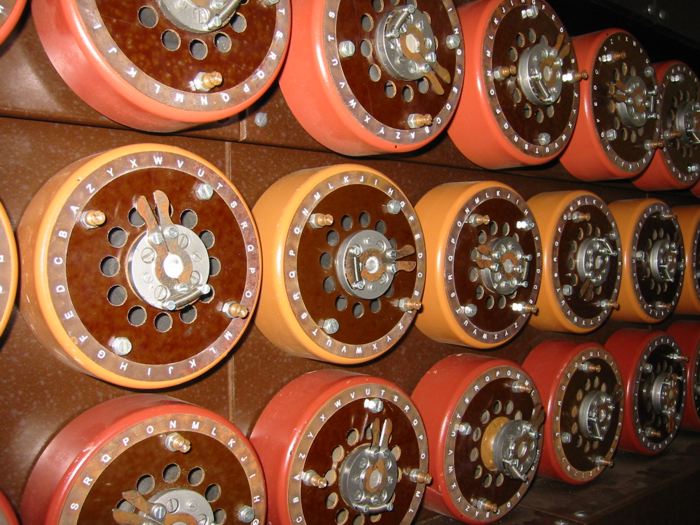 |
| Bombe. |
Important gears in the machine of the history of computing are sometimes connected, sometimes disconnected. The British Government created one of the biggest disconnects by burying its own pioneering World War II work behind curtains of information classification.
The Government shielded details of their war time work on the electromechanical Bombe computer and the Bombe-related programmable electronic Colossus* computer far past the time when these systems' underlying mechanisms were well known. This resulted in a dark veil dropping over much of the work of Alan Turing, who studied at Cambridge and Princeton and who was a tremendously significant figure in Bombe and the ACE stored-program computer. People close to the story were well aware of Turing, however.
Turing is the subject of "The Man Who Knew Too Much- Alan Turing and the Invention of the Computer" by David Leavitt. Though pivotal, much of Turing's work was really part of the prehistory of computing, and Leavitt faces a difficult task in conveying the drama of Turing's life, which took place largely in the dark and dry halls of academia. He helped his people – Bombe cryptanalysis saved thousands of lives in W.W.II – but, as a homosexual in England in the 1950s, he was indicted, hounded out of government work, punished with barbarian pseudoscientific "fixatives" and driven to suicide.
The suicide and the hounding make any Turing story a tragic story. The author here struggles to convey the facts and suggest the meaning. David Leavitt's biography is all in all pretty readable, and he tries hard to effectively provide quick summation of a lot of difficult philosophical and mathematical research that comprised Turing's life work. It is tough going. Turing worked from first principles - to a greater extent than necessary, some say. Turing studied under both John Von Neumann and Ludwig Wittgenstein, and this is not the stuff of a Vin Diesel movie. Where the book has trouble in in the "big picture" stuff. Turing's computer work came after Bertrand Russell and before Howard Aiken, for what that is worth. His "Turing Machine" theory is an underpinning for modern computing, but a difficult topic that does not exactly jump off the pages here.
*British engineer Tommy Flowers applied for a loan from the Bank of England to build another machine like Colossus but was denied the loan because the bank did not believe that such a machine could work. He could not argue that he had already designed and built many of these machines because his work on Colossus was covered by the Official Secrets Act.
Related
http://en.wikipedia.org/wiki/Tommy_Flowers
http://en.wikipedia.org/wiki/Bombe
http://moontravellerherald.blogspot.com/search?q=shannon
http://moontravellerherald.blogspot.com/2013/01/tale-from-crypt.html
No comments:
Post a Comment